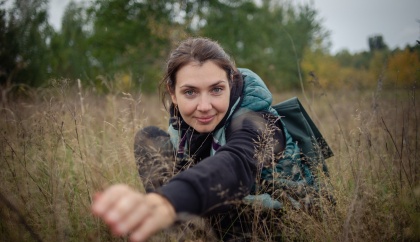
How can we protect the nature of our homeland and rehabilitate the environment after the liberation of the Zaporizhzhia region from the occupiers? What requires our attention now? How to communicate with the authorities in order to implement environmental projects?
Reprinted from Vidbudova. Zaporizhzhia.
Students of Zaporizhzhia Gymnasium #19 are actively looking for answers to these “grown-up” questions. In April, the school hosted the Environmental Marathon “Planet Earth – The Territory of Dreams.” One of the most interesting events of the marathon was the screening of the documentary “And Every River,” attended by the film's director Olesia Morgunets-Isaenko. For more than a year now, the Docudays UA film club “Dream Bulletin” has been working in the gymnasium as part of the DOCU/CLUB Network. Moderator of the film club Andriy Yelkin says that documentary films help explain human rights to children and teach them to defend their rights, as well as discuss and respect the opinions of other people. “Schoolchildren follow the cinematic stories of their peers from Ukraine and other countries, get inspiration from their solutions to various problems, and learn to be conscious and active people,” says Andriy Yelkin. The gymnasium pays a lot of attention to environmental protection. According to the moderator of the film club, the problem of river ecology is relevant for schoolchildren, because their curriculum comprises the issue of water conservation.
“And Every River” also touches on the topic of river pollution in Zaporizhzhia region. The environmental situation here has deteriorated significantly due to the hostilities, so the environment is also an important issue for local residents. “Schoolchildren understand that not only themselves, but also the future generations will have to solve the problem of pollution of rivers and territories as a result of military operations. That is why it is very important to know what levers of influence on the government the citizens have to protect and restore the environment,” says Andriy Yelkin. Schoolchildren from Zaporizhzhia asked the film's director Olesia Morgunets-Isaenko how she collected information for the film and cooperated with local authorities. They wanted to know whether Ukrainian authorities adhere to the standards of public relations stipulated in the Convention. In fact, the discussion after the screening turned into a training session on environmental rights protection. Schoolchildren discussed how the occupiers violate people's right to access to water in the temporarily occupied territories of the region, and what measures Zaporizhzhia residents should take in case of blackouts and infrastructure destruction. Photo: A still from the film “And Every River”
Photo: A still from the film “And Every River”

Photo: A still from the film “And Every River” “For them, it was the first experience of such a conversation. We plan to continue meetings with the directors and protagonists of documentary films in our school film club. If teachers or students from other educational institutions in Zaporizhzhia want to organize a film club session for their students, I am ready to help them. War and distance education should not hinder the development of our children,” emphasizes the film club moderator. According to him, documentaries about children's rights and human rights create the basis for a substantive conversation and become an impetus for children to develop deeper interest in the topic. Title photo: Olesya Morgunets-Isaenko / Facebook. The development of the DOCU/CLUB Network is funded by the United States Agency for International Development (USAID), the Embassy of Sweden in Ukraine, the National Endowment for Democracy (NED) and Fondation de France. The opinions, conclusions, or recommendations are those of the authors and compilers of this publication and do not necessarily reflect the views of the governments or charitable organizations of these countries. The authors and compilers are solely responsible for the content of this publication.



